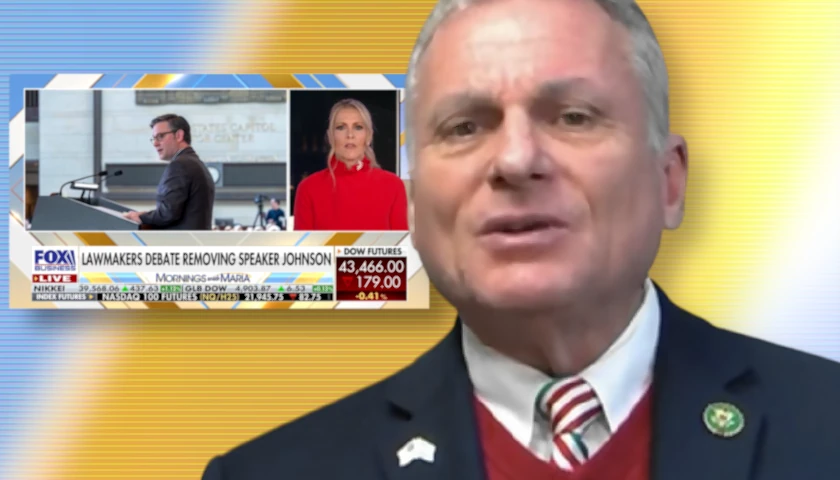by Aaron Kliegman
Democrats’ virtual 180 on the issue of crime — a journey from supporting the “defund the police” movement to espousing tougher law enforcement — has been accentuated by a striking pattern in recent months: prominent liberals being mugged, sometimes quite literally, by the harsh reality of rising crime as victims themselves.
The latest liberal to embody this shift is Bill Walton, the 69-year-old basketball legend-turned-garrulous broadcaster, who has a history of stirring controversy and advocating a range of progressive causes over the years.
More recently, he backed income and business tax hikes to fund homeless services and supported Black Lives Matter rioters condemning police brutality following George Floyd’s death in 2020.
Over the last several weeks, however, Walton has adopted a strikingly different tone on law and order while blasting Todd Gloria, the Democrat mayor of his longtime home San Diego — and a man with whom he aligns politically.
The website Voice of San Diego documented several emails that Walton has sent to Gloria demanding more action to get a handle on the city’s homeless crisis, including one message in which the NBA hall of famer not only said he was assaulted but also implied it happened before.
“Once again, while peacefully riding my bike early this Sunday morning in Balboa Park, I was threatened, chased, and assaulted by the homeless population, in our park,” Walton wrote Aug. 28. “Once again, you’ve done, and continue to do, nothing.”
Four days earlier, Walton wrote, “You speak of the rights of the [homeless], what about our rights, we follow the rules of a functioning society, why are others allowed to disregard those rules. your lack of action is unacceptable, as is the conduct of the homeless population [sic].”
While not being specific about what changes he wants to see, Walton, who’s known as San Diego’s biggest booster and unofficial spokesman, called for greater “enforcement,” noting a recently passed measure in Los Angeles banning homeless encampments near schools.
“You have failed, us and yourself,” he wrote Sept. 2.
Then this week, Walton took to Instagram to deliver a public message to Gloria.
“I can no longer say that SD is a safe, healthy, clean, and beautiful place, I can no longer urge my family, friends, tourists, and businesses to come to SD to live, work, and play,” he wrote. “Mayor @toddgloria — clean up our city, and let us reclaim our lives, we must fix our homeless crisis, we need engagement, rehabilitation, and constant enforcement, and we need it now.”
Meanwhile, another liberal Californian also seemed to adopt a different posture toward law and order after being the victim of a crime.
The home of Democratic Rep. Karen Bass, who’s currently running for mayor of Los Angeles, was burglarized last week. Two men were charged with stealing two firearms from Bass’ home.
Bass has pushed to increase “the economic and social vitality of our communities” rather than policing in order to lower crime rates.
“We’ve tried arresting our way out of the problem before — it doesn’t work,” her website states. “Research has shown that investments in creating good-paying jobs have a greater impact on crime than comparable funds invested in increased policing.”
Total arrests in L.A. this year to date are down 11% compared to this time in 2021.
However, homicides are on pace to hit a 15-year high. Meanwhile, so far this year robberies are up 17%, burglaries 15%, and motor vehicle thefts 14% compared to this time in 2021, according to L.A. Police Department statistics. Overall violent crime is also on the rise.
Yet when Bass was asked at a mayoral debate this spring how safe she felt walking around her L.A. neighborhood on a scale from one to 10, she responded: “I do feel safe. I would say a ten. But I do understand that a lot of people around the city do not feel safe, and I respect that.”
After the break-in, she changed her answer to a five.
“Angelenos all around the city are not feeling safe,” Bass told Fox 11. “I did feel safe until my safety was shattered, like so many Angelenos.”
Earlier this year, L.A. gangs made headlines for a string of “follow-home robberies” targeting wealthy city residents.
Bass called for hiring more police officers and taking current officers from behind the desk and putting them on the street in “neighborhoods that want to see an increased presence” — a position she’s echoed before.
Moving to the Midwest, Illinois Democrat state Sen. Kimberly Lightford was carjacked at gunpoint in suburban Chicago in December.
Hours later, Pennsylvania Democrat Rep. Mary Gay Scanlon was also carjacked at gunpoint, this time in Philadelphia.
In 2020, Lightford proposed slashing Chicago’s police budget by $80 million (the proposal was later scaled back to $59 million) and boasted in an op-ed last year that she helped eliminate cash bail and institute new police training requirements.
“Our community believes that trust won’t be restored between the police and the public until training, supervision, and accountability reforms ensure everyone is protected without bias. Amen,” she wrote.
Scanlon, meanwhile, has cosponsored several pieces of police reform legislation.
“We have seen too many lives taken and communities devastated by police brutality and racial profiling,” she tweeted after George Floyd’s death. “Action is long overdue. @HouseDemocrats are fighting for REAL reform in our country’s police departments. #JusticeInPolicing.”
According to Scanlon’s website, she fights to “dismantle systems of hate” and “hold law enforcement officers accountable.”
Months later, Democrats in both Illinois and Pennsylvania — especially Chicago and Philadelphia — are facing backlash for their approach to law and order amid spikes in crime.
In Illinois, Republicans have been hammering Democrats for being soft on crime in recent weeks. A recently passed crime law backed by Democrats known as the Safe-T Act has especially come under fire for eliminating cash bail and not allowing police officers accused of misconduct to be told the identity of their accuser, among other measures.
However, Democrats in the state have backed off their 2020 efforts to defund the police amid rampant crime, with Chicago leaders slightly increasing the city’s police budget.
This month, Chicago Democrat Alderman George Cardenas, decried the ongoing crime surge in the city, tweeting: “Public safety in Chicago is a joke. Why bother calling police?”
In Pennsylvania, Philadelphia DA Larry Krasner, a poster boy of the so-called progressive prosecutor movement, has come under the microscope for his soft-on-crime policies.
The state Legislature formed a bipartisan committee to investigate a crime spree in Philadelphia. The committee will be allowed to subpoena witnesses and documents from Krasner’s office and can make evidence-based recommendations up to the impeachment of Krasner.
Pennsylvania doesn’t have recall elections.
The committee issued a subpoena for Krasner, who refused to comply, calling it “illegal,” “antidemocratic,” and “wholly illegitimate.” State legislators voted to hold him in contempt for not complying.
Krasner has also dismissed the effort as partisan, although numerous Democrats have joined Republicans in supporting it. Indeed, Democrats are increasingly keeping their distance from Krasner as Republican candidates target him as the face of Democrats’ crime policies.
Violent crime has skyrocketed since Krasner took office, in part because he made it a priority to prosecute fewer illegal gun charges, cut the future years of incarceration by half, and slash the length of parole in probation supervision by nearly two-thirds compared to the previous DA.
In another shift in the Keystone State, Pennsylvania Democrat Senate nominee John Fetterman walked back his apparent call to release all second-degree murderers with life sentences from Pennsylvania’s prisons. Fetterman’s about-face was part of a broader move among Democrats running for office in high-profile races nationwide walking back many of the progressive positions they once embraced in an effort to make their candidacies palatable to more moderate general election voters.
Moving back to the West Coast, former California Democrat Sen. Barbara Boxer was mugged and assaulted in broad daylight in Oakland, Calif., last summer.
The prior August, during the 2020 presidential campaign, Boxer had suggested violent crime would significantly decrease if Joe Biden were elected.
“In Trump’s America heartbreaking violence is rampant because this president doesn’t care about solving the crisis, doesn’t understand how to bring calm out of chaos & actually is fomenting the divisions & violence,” she tweeted. “If you don’t like the violence in Trump’s America vote #Biden2020.”
In Portland, Ore., meanwhile, Democrat Mayor Ted Wheeler was attacked last year by activists while dining out just days after vowing to get tough with far-left Antifa.
Portland has been the scene of Antifa riots for years, leading critics to charge Wheeler didn’t do enough to stop the violence.
However, Wheeler, who pledged to cut the city’s police budget by millions in 2020 before backtracking a year later, said in March he plans to hire 200 new police officers.
Wheeler’s shift is another example of a broader 180 by Democrats nationwide who supported the defund the police movement but walked back their stance as crime surged.
This shift was especially evident in San Francisco, where crime skyrocketed as then-DA Chesa Boudin prosecuted significantly fewer felonies and misdemeanors than his predecessors.
The crime situation in San Francisco got so bad that Mayor London Breed, a liberal Democrat who in 2020 announced her plan to cut $120 million from law enforcement and redirect the funds to social programs, changed course.
Breed made an emergency request to the city Board of Supervisors for more money for the police to support a crackdown on crime.
“It’s time the reign of criminals who are destroying our city, it is time for it to come to an end,” she said. “And it comes to an end when we take the steps to be more aggressive with law enforcement. More aggressive with the changes in our policies and less tolerant of all the bulls**t that has destroyed our city.”
Breed has continued her shift into this year, saying she will fight for more police officers.
Boudin, however, who said he wanted to abolish cash bail and end “mass incarceration,” didn’t go along with Breed, earning him a recall election in June in which fed-up voters ousted him from office in an effective referendum of his soft-on-crime policies.
San Francisco’s new DA, Brooke Jenkins, fired employees and named new hires upon taking office in an effort to hold repeat violent offenders accountable.
However, the backlash against city disorder has continued beyond Boudin’s ouster. In recent weeks, business owners have threatened not to pay their taxes unless the city addresses rampant drug use and a surging homeless crisis.
Breed recently responded to the merchants’ protest by pledging more police help if necessary.
These latest moves come as Republicans double down on the issue of crime, hounding Democrats with relentless attack ads for pushing policies that, they argue, contribute to rather than combat spikes in crime.
The GOP strategy has shown signs of working, tightening races where Republicans had been trailing, according to recent polling.
For months, polls have shown not only that crime is a top issue for voters but also that voters trust Republicans more than Democrats when it comes to combating crime.
House Republican leaders on Friday unveiled their “Commitment to America,” a policy platform broadly outlining the GOP’s goals should they reclaim control of the chamber after the midterm elections.
At the center of the platform is an anti-crime agenda that includes a “crackdown on prosecutors and district attorneys who refuse to prosecute crimes.”
– – –
Aaron Kliegman is an enterprise reporter for Just the News, where he covers everything under the sun — from culture, to politics, to national security. Before coming to Just the News, Aaron worked as a writer and researcher at Gingrich 360, a media production company. Previously, he was a staff writer and news editor for the Washington Free Beacon, where he reported news and wrote analysis and commentary on foreign policy. Aaron has also worked as a freelance writer, penning work that has been published in a range of publications, such as the New York Post and the American Interest.








